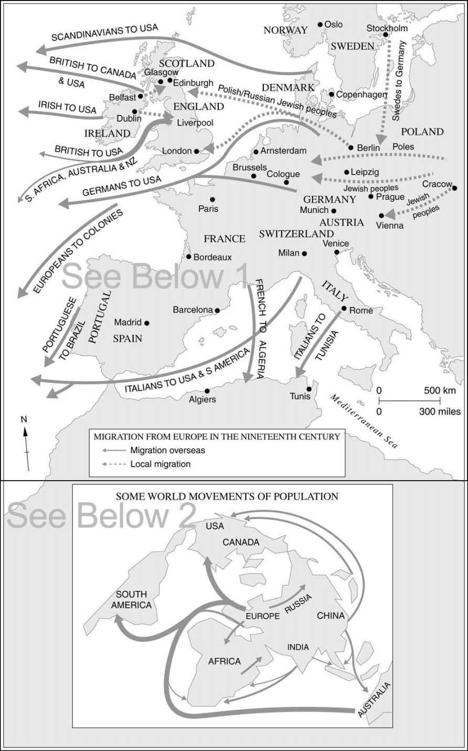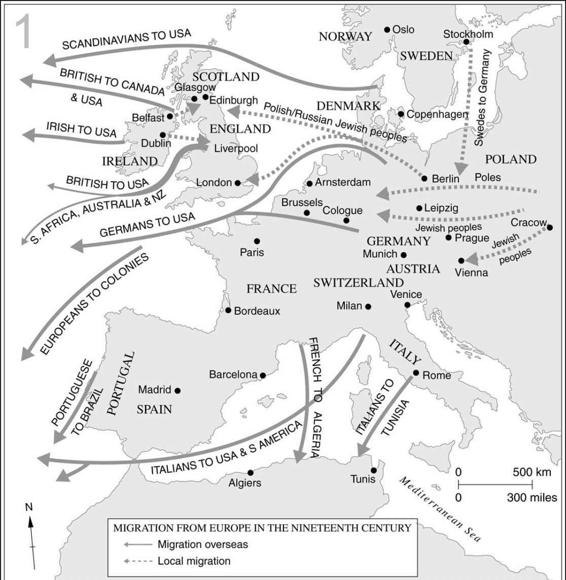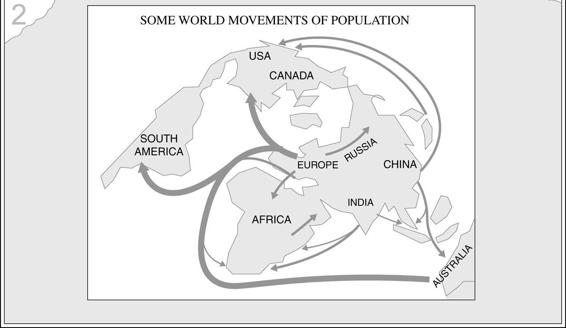The New Penguin History of the World (162 page)
Read The New Penguin History of the World Online
Authors: J. M. Roberts,Odd Arne Westad

The daily life of millions changed, too. Railways, electric trams, steamships, motor cars and bicycles gave individuals a new control over their environment; they quickened travel from place to place and speeded up land transport for the first time since animals had been harnessed to carts thousands of years before. The overall result of such changes had been that in many countries a growing population had been easily carried on an even faster growing production of wealth; between 1870 and 1900, for example, Germany’s output of pig-iron increased sixfold, but her population rose only by about a third. In terms of consumption, or of the services to which they had access, or in the enjoyment of better health, even the mass of the population in developed countries was much better off in 1900 than their predecessors a hundred years before. This still left out people like the Russian or Andalusian peasants (though an assessment of their condition is by no means easy to make nor the result a foregone conclusion). But, none the less, the way ahead looked promising even for them, inasmuch as a key to prosperity had been found which could be made available to all countries.
In spite of this cheerful picture, doubts could break in. Even if what might happen in the future were ignored, contemplation of the cost of the new wealth and doubts about the social justice of its distribution were troubling. Most people were still terribly poor, whether or not they lived in rich countries where the incongruity of this was more striking than in earlier times. Poverty was all the more afflicting when society showed such obvious power to create new wealth. Here was the beginning of a change of revolutionary import in expectations. Another change in the way men thought about their condition arose over their power to get a livelihood at all. It was not new that men should be without work. What was new was that situations should suddenly arise in which the operation of blind forces of boom and slump produced millions of men without work concentrated in great towns. This was ‘unemployment’, a new phenomenon for which a new word had been needed. Some economists thought that it might be an inevitable concomitant of capitalism. Nor were the cities themselves yet rid of all the evils which had so struck the first observers of industrial society. By 1900 the majority of western Europeans were town-dwellers. By 1914 there were more than 140 cities of over 100,000 inhabitants. In some of them, millions of people were cramped, ill-housed, under-provided with schools and fresh air, let alone amusement other than that of the streets, and this often in sight of the wealth their society helped to produce. ‘Slums’ was another word invented by the nineteenth century. Two converging conclusions were often drawn from contemplating them. One was that of fear: many sober statesmen at the end of the nineteenth century still distrusted the cities as centres of revolutionary danger, crime and wickedness. The other was hopeful: the condition of the cities gave grounds for assurance that revolution against the injustice of the social and economic order was inevitable. What both these responses neglected, of course, was the accumulating evidence of experience that revolution in western Europe was in fact less and less likely.



The fear of revolution was fed also by disorder, even if its nature was misinterpreted and exaggerated. In Russia, a country which was clearly a part of Europe if it is contrasted with the rest of the world, but one which had not moved forward rapidly along the lines of economic and social progress, reform had not gone far enough and there was a continuing revolutionary movement. It broke out in terrorism – one of whose victims was a tsar – and was assisted by continuing and spontaneous agrarian unrest. Peasant attacks on landlords and their bailiffs reached a peak in the early years of the twentieth century. When there ensued defeat in war at the hands of the Japanese and the momentary shaking of the regime’s confidence, the result was a revolution in 1905. Russia might be, and no doubt was, a special case, but Italy, too, had something that some observers thought of as barely contained revolution in 1898 and again in 1914, while one of the great cities of Spain, Barcelona, exploded into bloody street-fighting in 1909. Strikes and demonstrations could become violent in industrialized countries without revolutionary traditions, as the United States amply showed in the 1890s; even in Great Britain deaths sometimes resulted from them. This was the sort of data which, when combined with the sporadic activities of anarchists, kept policemen and respectable citizens on their toes. The anarchists especially succeeded in pressing themselves on the public imagination. Their acts of terrorism and assassinations during the 1890s received wide publicity; the importance of such acts transcended success or failure because the growth of the press had meant that great
publicity value could be extracted from a bomb or a dagger-stroke. In using such methods, not all anarchists shared the same aims, but they were children of their epoch: they protested not only against the state in its governmental aspects, but also against a whole society which they judged unjust. They helped to keep the old fear of revolution alive, though probably less than the rhetoric of their old rivals, the Marxists.
By 1900 socialism almost everywhere meant Marxism. An important alternative tradition and mythology existed only in England, where the early growth of a numerous trade-union movement and the possibilities of working through established political parties favoured a non-revolutionary radicalism. The supremacy of Marxism among continental socialists, by contrast, was formally expressed in 1896, when the ‘Second International’, an international working-class movement set up seven years before to coordinate socialist action in all countries, expelled the anarchists who had until then belonged to it. Four years later, the International opened a permanent office in Brussels. Within this movement, numbers, wealth and theoretical contributions made the German Social Democratic Party preponderant. This party had prospered in spite of police persecution thanks to Germany’s rapid industrialization, and by 1900 was an established fact of German politics, their first truly mass organization. Numbers and wealth alone would have made it likely that Marxism, the official creed of the German party, would be that of the international socialist movement, but Marxism also had its own intellectual and emotional appeal. This lay above all in its assurance that the world was already going the way socialists hoped, and the emotional satisfaction it provided of participating in a struggle of classes, which, Marxists insisted, must end in violent revolution.
Though such a mythology confirmed the fears of the established order, some intelligent Marxists had noticed that after 1880 or so the facts by no means obviously supported it. Manifestly, great numbers of people had been able to obtain a higher standard of living within the capitalist system. The unfolding of that system in all its complexity was not simplifying and sharpening class conflict in the way Marx had predicted. Moreover, capitalist political institutions had been able to serve the working class. This was very important; in Germany, above all, but also in England, important advantages had been won by socialists using the opportunities provided by parliaments. The vote was available as a weapon and they were not disposed to ignore it while waiting for the Revolution. This led some socialists to attempt to restate official Marxism so as to take account of such trends; they were called ‘Revisionists’ and, broadly speaking, they advocated a peaceful advance towards the transformation of society by socialism. If people liked to call that transformation, when it came, a
revolution, then only an argument about usage was involved. Inside this theoretical position and the conflict it provoked was a practical issue which came to a head at the end of the century: whether socialists should or should not sit as ministers in capitalist governments.
The debate which this aroused took years to settle. What emerged in the end was explicit condemnation of revisionism by the Second International while national parties, notably the Germans, continued to act on it in practice, doing deals with the existing system as suited them. Their rhetoric continued to be about revolution. Many socialists even hoped that this might be made a reality by refusing to fight as conscripts if their governments tried to make them go to war. One socialist group, the majority in the Russian party, continued vigorously to denounce revisionism and advocate violence; this reflected the peculiarity of the Russian situation, where there was little to hope for from parliamentary politics and a deep tradition of revolution and terrorism. This group was called Bolshevik, from the Russian word meaning a majority, and more was to be heard of it.
Socialists claimed to speak for the masses. Whether they did so or did not, by 1900 many conservatives worried that the advances gained by liberalism and democracy in the nineteenth century might well prove irresistible except by force. A few of them still lived in a mental world which was pre-nineteenth rather than pre-twentieth century. In much of eastern Europe quasi-patriarchal relationships and the traditional authority of the landowner over his estates were still intact. Such societies could still produce aristocratic conservatives who were opposed in spirit not merely to encroachments upon their material privilege, but to all the values and assumptions of what was to be called ‘market society’. But this line was more and more blurred and, for the most part, conservative thinking tended to fall back upon the defence of capital, a position which, of course, would in many places half a century earlier have been regarded as radically liberal, because individualist. Capitalist, industrial and conservative Europe opposed itself more and more vigorously to the state’s interference with its wealth, an interference which had grown steadily with the state’s acceptance of a larger and larger role in the regulation of society. There was a crisis in England on the issue which led to a revolutionary transformation of what was left of the 1688 constitution in 1911 by the crippling of the power of the House of Lords to restrain an elected House of Commons. In the background were many issues, among them higher taxation of the rich to pay for social services. Even France had by 1914 accepted the principle of an income tax.
Such changes registered the logic of the democratizing of politics in
advanced societies. By 1914, universal adult male suffrage existed in France, Germany and several smaller European countries; Great Britain and Italy had electorates big enough to come near to meeting this criterion. This brought forward another disruptive question: if men had, should not women have the vote in national politics? The issue was already causing uproar in English politics. But in Europe only Finland and Norway had women in their parliamentary electorates by 1914, though, further afield, New Zealand, two Australian states and some in the United States had given women the franchise by then. The issue was to remain open in many countries for another thirty years.
Political rights were one aspect of a larger question of women’s rights in a society whose overall bias, like that of every other great civilization which had preceded it, was towards the interests and values of men. Yet discussion of women’s role in society in Europe had begun in the eighteenth century and it was not long before cracks appeared in the structure of assumptions which had so long enclosed it. Women’s rights to education, to employment, to control of their own property, to moral independence, even to wear more comfortable clothes, had increasingly been debated in the nineteenth century. Ibsen’s play
A Doll’s House
was interpreted as a trumpet-call for the liberation of women instead of, as the author intended, a plea for the individual. The bringing forward of such issues implied a real revolution. The claims of women in Europe and North America threatened assumptions and attitudes which had not merely centuries, but even millennia, of institutionalization behind them. They awoke complex emotions, for they were linked to deep-seated notions about the family and sexuality. In these ways, they troubled some people – men and women alike – more deeply than the threat of social revolution or political democracy. People were right to see the question in this dimension. In the early European feminist movement was the seed of something whose explosive content would be even greater when transferred (as it soon was) to other cultures and civilizations as a part of the assault by western values.
